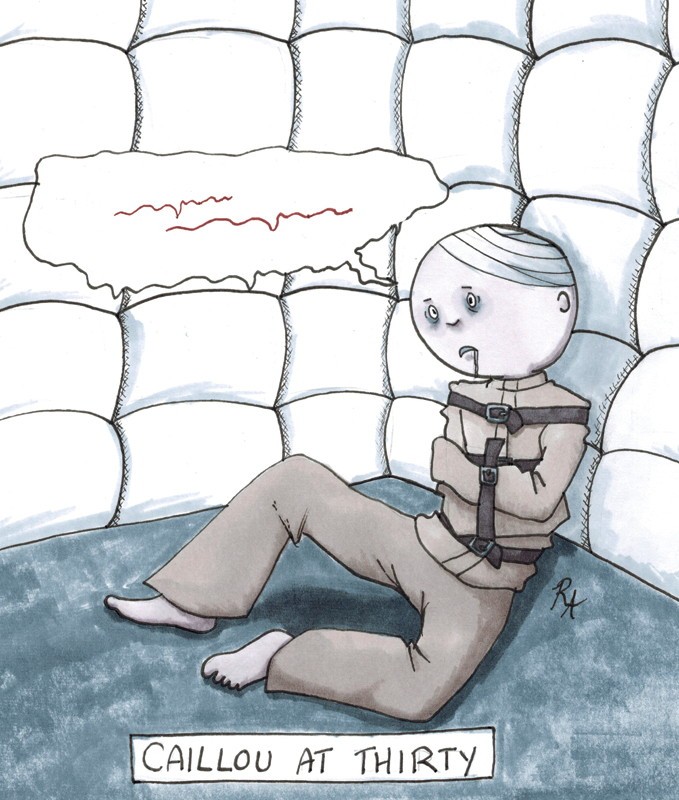TV trauma
The dark depths of Caillou and other shows you once thought were innocuous
Even though they make headlines pretty regularly these days, outcries of enraged parents rallying against the graphic depictions of wanton violence present in today’s video games - or the blatant promotion of female objectification in some popular music - are hardly enough to faze this jaded, broken husk of a man.
I’ve already been through far worse, you see - and I expect the same is true for you too, whether you know it or not.
Because while all of the big people were busy fretting over my ability to view fake explosions without, you know, exploding real stuff, I was quietly sitting in the next room - my unblinking young eyes reflecting the bright cartoon colours of the kids channel - learning not of my ABCs, but of the dark depths of the human soul.
Looking back, I’ve realized that some of the kids’ shows I grew up with had shockingly serious implications.
Caillou
I never actually liked watching the sparingly coloured, ultra-mundane “adventures” of this program’s namesake, but I guess the fact that I still kept coming back for more speaks to the all-too-powerful pull of the dreary philosophical black hole it offers.
The “plot” of each episode of Caillou generally consists of its titular hero - a hairless four-year-old boy who, utterly devoid of empathetic capacity, becomes emotionally compromised at the drop of a hat (literally, I imagine) - “overcoming” some sort of ordinary, everyday event.
These challenges (successfully accompanying his mother to the grocery store, going to the park, etc.) are made even more exciting by the introduction of some sort of easily avoidable conflict.
Caillou is prevented by his mother from shoplifting, for example. Or he has to not throw his little sister’s toys at her face.
Basically, Caillou has to choose between doing literally nothing and going out of his way to actively make an ass of himself, causing harm to others. Only after learning of the consequences of the latter option does he ever decide to be “good.”
I like to imagine whoever wrote this show as a commercially failed artist - scrawling his unfeeling creature’s dialogue atop a dimly-lit desk at 3 a.m. with a half empty bottle of cheap scotch and a loaded pistol set before him - as a sort of half-mad mastermind who set out, successfully, to perfectly embody the true nihilistic nature of the human animal and, by consequence, the meaninglessness of life.
Vision achieved.
George Shrinks
This kids’ show, based on the picture book of the same name, follows the life of George Shrinks, a 10-year-old boy who, as his name implies, is of a diminutive size.
At a glance, George seems to have it pretty good. His dad is a zany inventor who makes him all sorts of vehicles and contraptions to ride around the house in, and, unlike Caillou, he’s a pretty well-adjusted kid.
The dark message of George Shrinks, however, dwells in the shadowy peripheries of the show’s timeline.
Sure, George is 10 now, but how’s he ever going to live an independent life? How will he go to college, get a job or find a life partner?
What’s even more troubling is how George got to be the way he is in the first place - which is to say, by going to bed normal one day and waking up the next as a singular anomaly in his species’s history.
This is literally the only explanation for George’s state offered by the show.
That’s right, kids: absolutely any day, you can wake up to your new life as the victim of a crippling, scientifically unexplainable condition that will affect you forever.
Now go eat your damn breakfast.
Pokémon
As someone who devoted hour upon hour of his precious childhood to “catching ‘em all” on his Game Boy, it’s understandable that I was equally addicted to this brand’s TV show counterpart.
My university education has since exposed me to various cultural and psychological theories associated with the act of collection - the driving force of Pokémon’s popularity, no doubt - to unsavoury effect.
I honestly never would have guessed just how much phalluses had to do with the whole thing, all that time.
The real dark message put forth by Pokémon, however - because let’s be honest here: a few years into a B.A. and everything’s a phallus - seems like it should have been pretty obvious all along.
In this show’s universe, it’s perfectly acceptable - encouraged, even - to capture and amass a small army of apparently sentient beings and expect them to fight for your own entertainment on a whim.
“But they want to fight for Ash!” you say.
You might acquire friends by beating them until they submit themselves to your dominance, allowing you to capture them in a device that re-organizes their physical properties against their will - but speak for yourself, Poké-fan.
You must’ve watched even more Caillou than I did.
Carson Hammond is an honours English student at the University of Winnipeg and a beat reporter for The Uniter.
Published in Volume 67, Number 6 of The Uniter (October 11, 2012)







